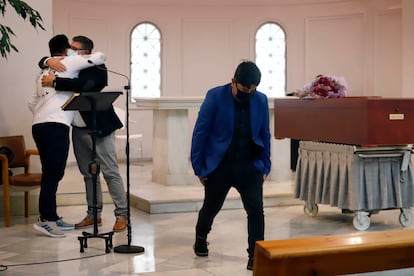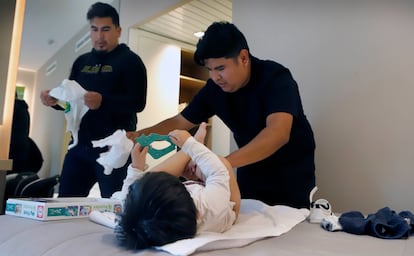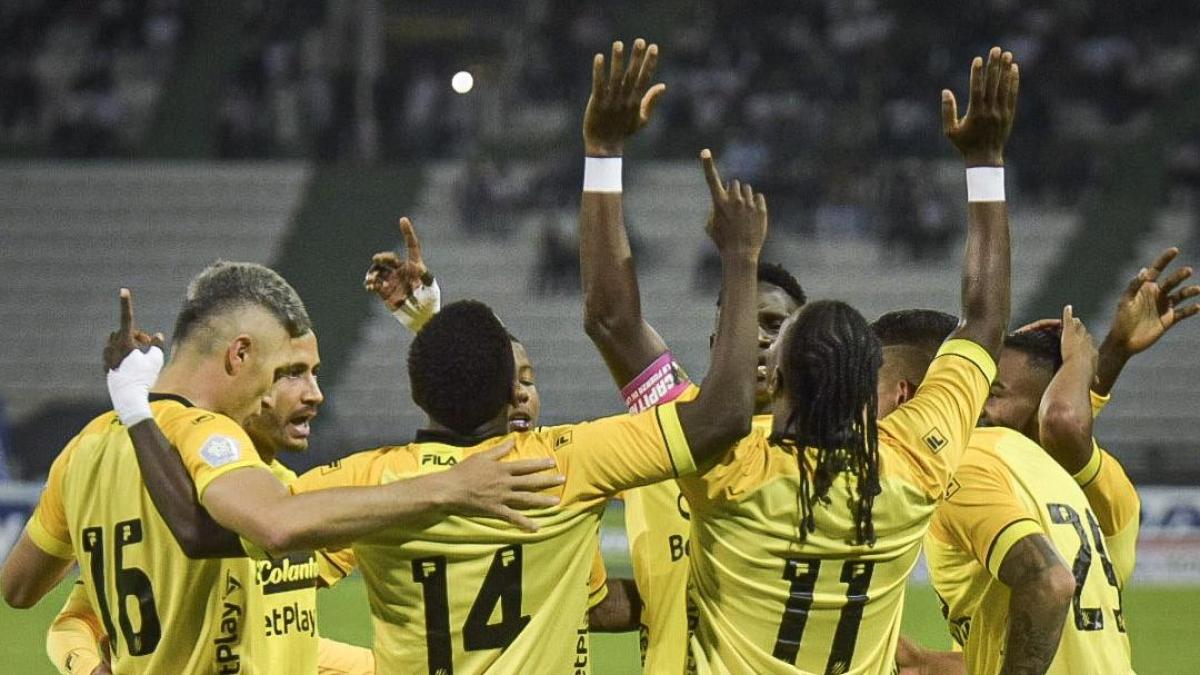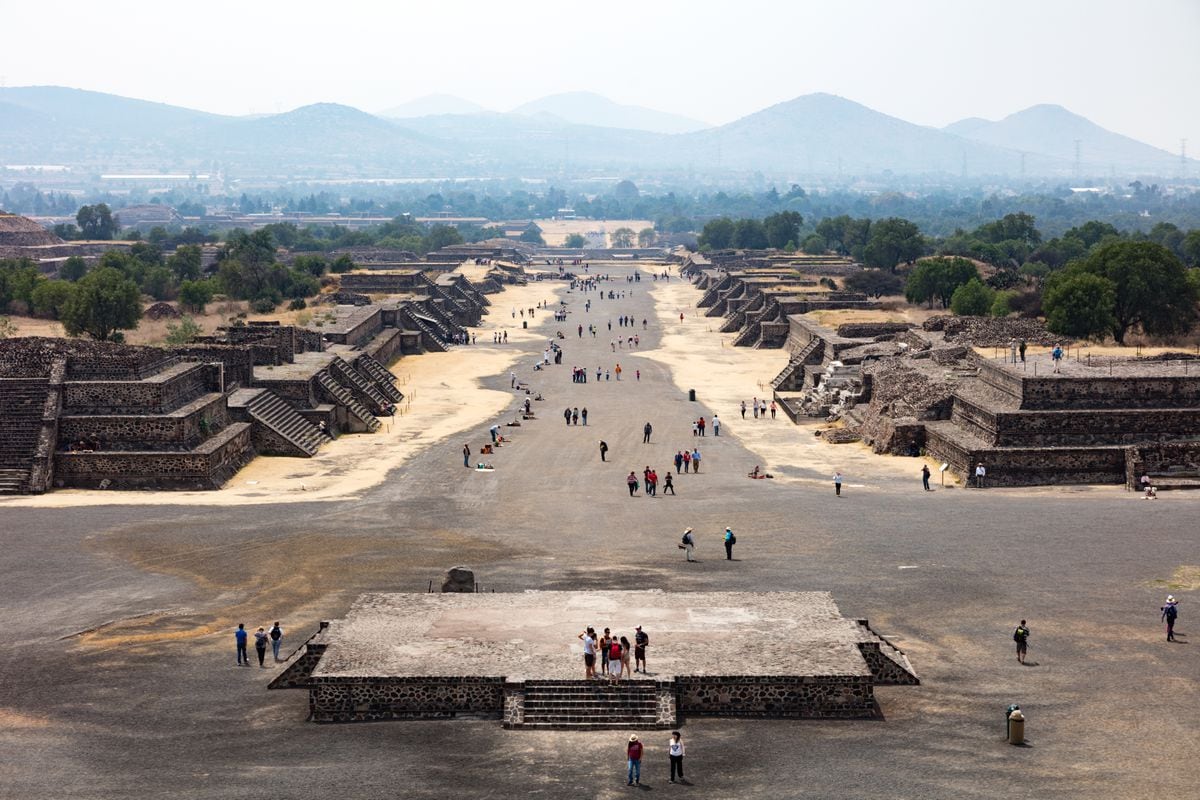On a semi-cloudy Friday afternoon in October, two workers from the Terrassa funeral home used a crane to seal Abigail’s tombstone, in the sixth row of niches in the cemetery. His brothers Ezequiel and Matías do not lose their eyes. About 30 people accompany them at the farewell. They were all strangers to them until just two months ago, now they are almost family. Thanks to them they can be here today, firing Abi, murdered by her husband. He killed her, burned her body in a field and then committed suicide in front of their daughter, little E., who turns two on the day of the funeral. Uncle Matu and Uncle Chiqui, as she calls them, are her closest relatives and they have come looking for her. The two young Argentines, aged 28 and 26, have traveled more than 10,000 kilometers from Buenos Aires to this city north of Barcelona that will forever house the remains of the dead sister. After a sexist murder there is usually no news, it seems that everything ends. For some people, it has only just begun.
Antonella Abigail, who was named after a soap opera, was murdered on July 29, 2021 at her home by her husband, Adrián, with whom she had lived in Terrassa since 2017. They moved from Buenos Aires because he found a job as a technician of systems.
The brothers had written to the family chat that day. “Doesn’t it seem strange to you that Abi doesn’t respond to the messages?” Matías asked Ezequiel after hours of silence. For two days they searched for clues on social media. In the stories From one of Abigail’s acquaintances on Instagram, Ezequiel came across the news of a “macabre discovery” in an open field in Sant Viçen, 28 kilometers from Terrassa. At first, he passed her by.

The last time the three brothers saw each other was at another funeral, that of their mother. In December 2020, Abigail traveled to Buenos Aires with little E., who then met her uncles in person, as they both remember sitting on the terrace of a hotel in Terrassa hours before burying her sister. Everything went wrong, they say, on March 25, when an accident occurred with a cup of tea.
That day, while the three brothers were chatting by video call as they used to do every week, the brother-in-law came out of the kitchen and left a cup of hot water on the table for tea. “He went to get something and the girl spilled the glass of water on her head. We began to hear their cries, ”says Matías. They heard Adrián’s insults: “You’re a bad mother, I can’t leave you alone with the baby, you’re always on your mobile.” The girl suffered second-degree burns to her left arm and had to have a skin graft done. He spent three weeks in the hospital.
Abigail then contacted a feminist organization, Punt Lila de Terrassa, and asked for their help after her husband tried to kick her out of the house. One of its members, Mireia, who asks to appear without a surname, says that they went up to four times to the mossos between April 12 and 21 to denounce that there were insults, economic violence and even an attack, but the agents did not believe her: “They said that this was a couple’s argument, that I should go home.” They then formalized the complaint with the local Terrassa police and there was a hearing, but the court refused to place a restraining order. Now she is dead.

An evangelical pastor directs Abigail’s funeral. It is the religion that the family professes. A black and white photo of her smiling presides over the room. She was 30 when she was murdered. Ezequiel addresses the audience from the lectern: “We are very grateful to you, each one of you helped us. They never left us alone ”. Mireia, who sits next to the brothers and a group of feminists from Terrassa, was the first person they contacted after the murder, who confirmed what had happened. They assure that no institution officially called them in those first days to inform them that their sister had been murdered. The first official condolences, that of the Terrassa City Council, did not reach them until September, more than a month later.
From the first moment, both were determined to take the girl to Buenos Aires. They contacted the consul, made a dozen calls to Spain and received as many. They were located from the Soledad Cazorla Scholarship Fund for orphans of sexist violence, which offered to pay for the flights. The brothers calculate that it would have cost them the equivalent of 10 months’ salary and they assure that neither the Spanish nor the Argentine governments wanted to pay it. They opened a collection online for the repatriation of the sister’s body, but they ended up discarding it because it was too expensive and they used the money to pay for their stay in Spain. The Terrassa City Council paid for the hotel they stayed in for almost a month and also Abigail’s niche after the feminists of Punt Lila asked for it in a meeting.
Nine days passed from the murder until Ezequiel and Matías were able to communicate with their niece, who was transferred to a shelter in the middle of the field, where she was isolated by covid accompanied by an educator. The first call lasted 15 minutes: “At the beginning I was with the computer and I didn’t want to know anything,” says Ezequiel. They sang to him and got him to connect with them right away. They both held back the emotion.
While they were preparing the trip to Spain, they began the procedures to be the guardians of the little girl. Social workers and lawyers visited them in Buenos Aires, reviewed the birth certificates of the three brothers, made a psychological report and inspected the family home, where they both live, to see if it was suitable for a minor. The little girl will occupy her grandmother’s room, which they renovated to give her a soft floor, a crib and toys.
On September 26, two months after the murder of their sister, they arrived in Spain on the first plane trip they have ever made. On the 27th, Monday, they finally met the girl. Little E. looked from one to the other and looked surprised. They spent more than an hour together: “The girl was shy, she didn’t want to play with us,” says Matías. Sources in the case explain that this first meeting was “very exciting.” The girl was first surprised, but immediately went with them. The professionals who have treated her emphasize that she adapts easily, it is not difficult for her to socialize. On the second visit they let her go out with her uncles. The girl was blowing kisses, she was very happy.
During their first week in Terrassa, visits to the girl gradually increased until they were able to spend a whole day together. They cooked him chicken and chips, for dessert he had gelatin and then took a nap. They have discovered that she is a very good girl, but she does not like to be told no. “She looks a lot like my sister,” says Matías.
Uncle Chiqui and Uncle Matu soon got hold of her. They learned how to change diapers and chose which lullabies were the best to put her to sleep. But what lies ahead is not easy. They will need psychological help so that the girl can one day understand the dimension of what happened. The team that treated her considers it an advantage that the girl is only two years old and is “so resilient” and sociable, according to sources in the case. “If the family fosters a situation as normalized as possible, without overprotecting it, their brain will be able to place this experience in a place that does not affect the rest of their development,” they add.

When the minor arrived at the reception center, she was not even babbling. In just a couple of days, she regained her speech and began to play games with another girl. She never asked her caregivers about her parents, but she did ask her uncles. “One afternoon, while we were trying to sleep during a nap, she started to say: My dad? My mom? ”Ezequiel recalls. “I started to cry”.
The psychologist Yolanda Bernáldez, who specializes in caring for victims of sexist violence, assures that “when a child is so small, what we have to answer is that her parents were with her, but they can no longer be. As it grows, it is important to tell the truth according to its evolutionary development, “he says. “It would not be healthy for the girl to grow up with the idea that the death of her parents was equitable because in time she will know the truth. It is important that you understand – I say it in gerund because it is a process – that sometimes the people who love you the most can hurt you. I am convinced that she can resume her own life, but pressure should not be put on the reconciliation of the girl with the father or the paternal family without respecting the processes of the child and for this a professional with a gender perspective is essential. In order to live he will have to understand how his father became that murderer. I would ask the maternal family how they feel about the murderous father. “
The two brothers assure that they have forgiven Adrián: “We do not focus on hatred, our thoughts are with the girl. Love for him, no. Sorry Yes”. They will be the ones who manage the minor’s relationship with the paternal family, who also live in Argentina.
Three days after the funeral they left for Buenos Aires. As the girl had just turned two years old, a ticket had to be bought for her at the same counter. The airline did not take charge that the flight had been delayed because they had to solve all the paperwork to be able to bury the murdered sister and take her niece with them. They are already home, and the little girl occupies her grandmother’s room, with a soft floor and a colorful mural.
“We know that he will be fine with us, love will not be lacking,” says Matías. In the future, they see her singing and playing an instrument, like them. And they even imagine an answer to the big question: “When they ask him about his parents, I hope he answers: ‘They are gone, but my uncles are there.”
#Life #Abigail






